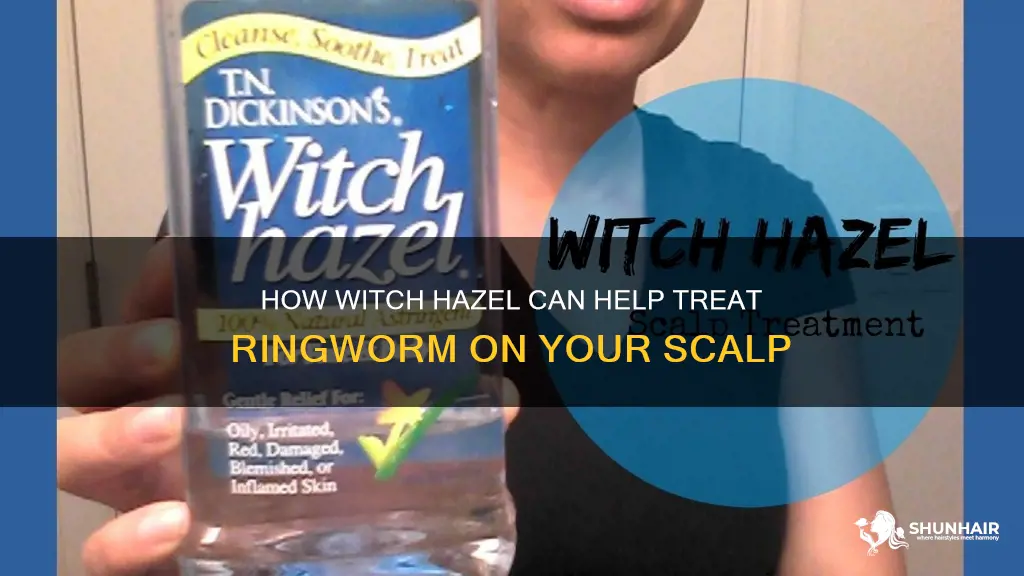
Witch hazel, a natural astringent often used for skincare, is gaining popularity for its potential healing properties. As contagious and uncomfortable as it may be, ringworm on the scalp is a common condition that affects many individuals. But can witch hazel really help with this frustrating condition? In this article, we will explore the potential benefits of using witch hazel to treat ringworm on your scalp, examining its properties and discussing its effectiveness in combating this stubborn infection. So, let's dive into the world of natural remedies and discover if witch hazel is the key to banishing ringworm from your scalp once and for all.
| Characteristics | Values |
|---|---|
| Antifungal properties | Yes |
| Soothes itching | Yes |
| Reduces inflammation | Yes |
| Astringent properties | Yes |
| Promotes healing | Yes |
| Can be used on the scalp | Yes |
| Helps treat ringworm | Yes |
What You'll Learn

What is ringworm on the scalp and its symptoms?
Ringworm on the scalp, also known as tinea capitis, is a common fungal infection that affects the scalp and hair follicles. This condition is most commonly seen in children, but it can also affect adults.
Ringworm on the scalp typically starts as a small pimple-like lesion on the scalp, which then becomes scaly and itchy. As the infection progresses, the affected area may become inflamed and swollen. In some cases, the hair around the infected area may break off, leading to bald patches.
Other common symptoms of ringworm on the scalp include:
- Red, circular rash: The infection typically starts as a small, red bump that gradually enlarges and forms a circular or oval shape. The edges of the rash are often raised and may be scaly.
- Itchy scalp: The affected area is usually itchy, leading to constant scratching. However, scratching can further spread the infection to other parts of the scalp or to other individuals.
- Swollen lymph nodes: In some cases, the lymph nodes near the infected area may become swollen and tender to the touch.
- Patches of scaling or flaking skin: As the infection progresses, the affected area may develop patches of scaling or flaking skin. These flakes may appear like dandruff but are actually caused by the fungus.
- Hair loss: In severe cases, ringworm on the scalp can lead to temporary hair loss or the formation of bald patches. The hair loss is usually caused by the destruction of hair follicles by the fungus.
If you suspect that you or someone you know has ringworm on the scalp, it is important to seek medical attention as soon as possible. A healthcare professional, such as a dermatologist, can accurately diagnose the condition and prescribe appropriate treatment.
Early treatment is crucial to prevent the spread of the infection and to minimize the risk of complications. The most common treatment for ringworm on the scalp is an oral antifungal medication, which is usually taken for several weeks.
While over-the-counter treatments like creams or shampoos may provide temporary relief from symptoms, they are generally not effective in treating ringworm on the scalp. It is important to follow the prescribed treatment plan and take the medication for the entire course, even if symptoms improve.
Additionally, it is important to practice good hygiene to prevent the spread of the infection. This includes avoiding sharing personal items like combs, hats, or pillows, as well as regularly washing and drying hair and scalp thoroughly.
In conclusion, ringworm on the scalp is a fungal infection that can cause itchy, scaly, and inflamed patches on the scalp. Early diagnosis and treatment are essential to prevent complications and minimize the spread of the infection. If you suspect that you or someone you know has ringworm on the scalp, it is important to consult a healthcare professional for proper diagnosis and treatment.
Can Athlete's Foot Spread to the Scalp? Understanding the Possibilities
You may want to see also

How does witch hazel work against ringworm on the scalp?
Ringworm on the scalp, also known as tinea capitis, is a fungal infection that can cause itching, flaky patches, and hair loss. It is unpleasant and can be difficult to treat. However, there are several remedies available, including witch hazel, which can help alleviate the symptoms and speed up the healing process.
Witch hazel is a natural astringent derived from the leaves and bark of the witch hazel plant. It has been used for centuries for its medicinal properties and is known for its anti-inflammatory and antifungal properties. When applied topically, witch hazel can help reduce the symptoms of ringworm on the scalp and promote healing.
Here's how witch hazel works against ringworm on the scalp:
- Antifungal properties: Witch hazel contains tannins, which have antifungal properties. These tannins can help kill the fungus that causes ringworm and prevent its growth. Applying witch hazel directly to the affected areas can help eliminate the fungus and relieve the symptoms of ringworm on the scalp.
- Soothes itching and inflammation: Ringworm on the scalp can cause intense itching and inflammation. Witch hazel can help soothe these symptoms by reducing inflammation and relieving itching. It can provide immediate relief from the discomfort associated with ringworm.
- Cleanses the scalp: Witch hazel is a natural cleanser and can help remove dirt, oil, and debris from the scalp. Keeping the scalp clean is essential for treating ringworm and preventing its spread. Witch hazel can effectively cleanse the scalp, ensuring that the affected areas are free from any potential sources of reinfection.
To use witch hazel for ringworm on the scalp:
- Start by diluting the witch hazel with water. Mix equal parts of witch hazel and water in a clean container.
- Gently apply the diluted witch hazel to the affected areas on the scalp using a clean cotton ball or pad. Be sure to cover all the visible patches of ringworm.
- Leave the witch hazel on for about 10-15 minutes, allowing it to penetrate the skin and work against the fungus.
- Rinse off the witch hazel with lukewarm water and pat the scalp dry with a clean towel. Avoid rubbing the affected areas vigorously, as this can irritate the scalp.
- Repeat this process two to three times a day until the ringworm symptoms improve. It is essential to be consistent with the application to maximize the effectiveness of the treatment.
In addition to using witch hazel, it is crucial to practice good hygiene and take other measures to prevent the spread of ringworm. These include washing your hands regularly, avoiding sharing personal items such as combs and hats, and keeping your scalp clean and dry.
While witch hazel can be effective in relieving the symptoms of ringworm on the scalp, it is essential to consult a healthcare professional for a proper diagnosis and guidance on the appropriate treatment plan. In some cases, prescription antifungal medications may be necessary to completely eradicate the infection.
Can COVID-19 Lead to Dry Scalp? Exploring the Possible Links
You may want to see also

Ways to use witch hazel for treating ringworm on the scalp
Ringworm is a common fungal infection that can affect various parts of the body, including the scalp. If you are dealing with ringworm on your scalp, you may be wondering if there are any natural remedies that can help. One such remedy is witch hazel, a plant-derived liquid known for its astringent and anti-inflammatory properties. In this article, we will explore ways to use witch hazel for treating ringworm on the scalp.
- Topical application: The most direct way to use witch hazel for scalp ringworm is by applying it topically. Start by thoroughly washing your scalp with a mild shampoo and then dry it completely. Take a cotton ball and soak it in witch hazel. Gently dab the cotton ball on the affected areas of your scalp, making sure to cover the entire area. Repeat this process two to three times a day for at least two weeks. Witch hazel's anti-inflammatory properties may help soothe the affected skin and reduce redness and itching.
- Witch hazel compress: Another method you can try is making a witch hazel compress. Soak a clean cloth or towel in witch hazel and apply it directly to the affected areas of your scalp. Leave it on for about 15 minutes and then remove. Repeat this process twice a day. The compress can help alleviate the symptoms of ringworm, such as itching and irritation.
- Witch hazel shampoo: You can also incorporate witch hazel into your regular shampoo routine. Add a few drops of witch hazel to your shampoo and mix well. Use this mixture to wash your scalp, focusing on the areas affected by ringworm. Let the shampoo sit for a few minutes before rinsing it off. This method can help cleanse the scalp and reduce the fungal overgrowth responsible for ringworm.
- Witch hazel spray: If you prefer a more convenient application method, you can make a witch hazel spray. Mix equal parts of witch hazel and water in a spray bottle. Shake well to ensure the ingredients are thoroughly mixed. Spray the solution onto your scalp, targeting the ringworm-affected areas. Allow it to air dry. You can use this spray multiple times a day to keep the affected area clean and minimize discomfort.
- Witch hazel and tea tree oil blend: Tea tree oil is known for its strong antifungal properties and can enhance the effectiveness of witch hazel for ringworm treatment. Mix a few drops of tea tree oil with witch hazel and apply it to the scalp with a cotton ball or your fingertips. Leave it on for 15-20 minutes and then rinse thoroughly. This combination can help kill the ringworm fungus and reduce inflammation.
While witch hazel may offer some relief from scalp ringworm, it is important to note that it is not a cure. If the infection persists or worsens despite using witch hazel, it is recommended to consult a healthcare professional for further evaluation and treatment options. In some cases, oral antifungal medications may be necessary to effectively eliminate the infection.
In conclusion, witch hazel can be a useful addition to your ringworm treatment routine. Its astringent and anti-inflammatory properties may help alleviate symptoms and support the healing process. Remember to practice good hygiene, avoid sharing personal items, and keep your scalp clean and dry to prevent further spread of the infection.
Understanding the Potential Impact of Fetal Scalp Stimulation on Infant Stress Levels
You may want to see also

Precautions and other natural remedies for ringworm on the scalp
Ringworm on the scalp, also known as tinea capitis, is a common fungal infection that affects the scalp and hair follicles. It is highly contagious and can cause symptoms such as itching, redness, hair loss, and scaly patches on the scalp.
While witch hazel is commonly used for various skin conditions, such as acne and eczema, there is limited evidence to suggest its effectiveness in treating ringworm on the scalp. However, there are several precautions and natural remedies that can help manage the infection and promote healing.
Precautions for Ringworm on the Scalp:
- Avoid sharing personal items: Ringworm is highly contagious, so it's important to avoid sharing hats, combs, brushes, towels, or other personal items that may come into contact with the scalp.
- Maintain good hygiene: Wash your hands frequently with soap and water, especially after touching or scratching the affected area.
- Avoid scratching the scalp: Scratching can worsen the infection and increase the risk of spreading it to other areas of the body. Keep nails short and clean to minimize the temptation to scratch.
- Wash bedding and clothing: Regularly wash and dry bedding, towels, and clothing, especially those that come into contact with the scalp, in hot water to kill the fungus.
- Disinfect combs and brushes: To prevent the spread of the infection, clean combs and brushes regularly with hot water and/or antifungal disinfectants.
- Avoid close contact with infected individuals: Ringworm is highly contagious, so avoid close contact with individuals who have the infection until it has cleared.
Natural Remedies for Ringworm on the Scalp:
- Tea tree oil: Apply a diluted solution of tea tree oil directly to the affected area. Mix a few drops of tea tree oil with a carrier oil, such as coconut oil, and apply it using a cotton swab or ball. Tea tree oil has antifungal properties that may help reduce the infection.
- Apple cider vinegar: Dilute apple cider vinegar with water and apply it to the scalp using a cotton ball or spray bottle. Leave it on for about 15 minutes before rinsing. Apple cider vinegar has antifungal properties that may help kill the fungus causing the infection.
- Aloe vera: Apply fresh aloe vera gel directly to the scalp and leave it on for about 30 minutes before rinsing. Aloe vera has antimicrobial and soothing properties that may help reduce the itching and inflammation associated with ringworm.
- Garlic: Crush a few garlic cloves and mix them with olive oil to make a paste. Apply the paste to the affected area and leave it on for about 20 minutes before rinsing. Garlic has antifungal properties that may help fight the infection.
- Coconut oil: Apply coconut oil to the scalp and leave it on for a few hours or overnight before rinsing. Coconut oil has antifungal properties that may help control the growth of the fungus causing ringworm.
- Grapefruit seed extract: Dilute grapefruit seed extract with water and apply it to the scalp using a cotton ball or spray bottle. Leave it on for about 15 minutes before rinsing. Grapefruit seed extract has antifungal properties that may help eliminate the fungus causing the infection.
It's important to note that these natural remedies may provide relief from the symptoms of ringworm on the scalp, but they may not completely cure the infection. If the symptoms persist or worsen, it is recommended to consult a healthcare professional for proper diagnosis and treatment. Additionally, individuals with a weakened immune system or severe infections may require antifungal medications prescribed by a doctor.
The Possible Harmful Effects of Mupirocin on Your Scalp
You may want to see also
Frequently asked questions
Witch hazel is not typically recommended for treating ringworm on the scalp. It may have some mild antifungal properties, but it is not considered a reliable treatment for this condition. It's best to consult with a healthcare professional for proper diagnosis and treatment options.
The most common treatment for ringworm on the scalp is antifungal medication, such as oral antifungals or antifungal shampoos. These medications are prescribed by a healthcare professional and are more effective than home remedies like witch hazel.
While there are some natural remedies that may have antifungal properties, such as tea tree oil or coconut oil, they are not considered proven or reliable treatments for ringworm on the scalp. It's best to consult with a healthcare professional for appropriate diagnosis and treatment options.







